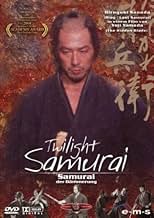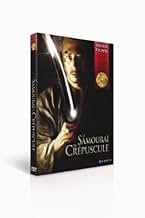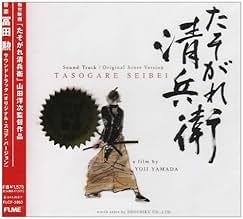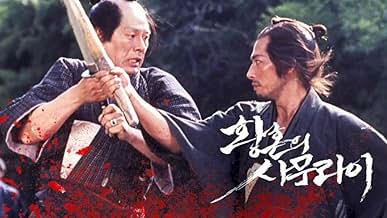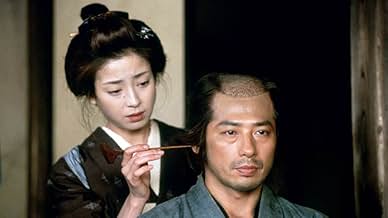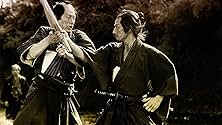Mentre l'era del Giappone feudale volge al termine, un samurai vedovo ha difficoltà a bilanciare la lealtà del clan, due giovani figlie, una madre anziana e l'improvvisa ricomparsa della sua... Leggi tuttoMentre l'era del Giappone feudale volge al termine, un samurai vedovo ha difficoltà a bilanciare la lealtà del clan, due giovani figlie, una madre anziana e l'improvvisa ricomparsa della sua cotta di metà d'infanzia.Mentre l'era del Giappone feudale volge al termine, un samurai vedovo ha difficoltà a bilanciare la lealtà del clan, due giovani figlie, una madre anziana e l'improvvisa ricomparsa della sua cotta di metà d'infanzia.
- Candidato a 1 Oscar
- 38 vittorie e 9 candidature totali
Trama
Lo sapevi?
- QuizOfficial submission of Japan for the 'Best Foreign Language Film' category of the 76th Academy Awards in 2004.
- BlooperWhile Seibei fighting with Toyotaro, Toyotaro katana fell on the ground, right beside Seibei. Toyotaro fell towards river and Seibei make step forward towards Toyotaro, so the katana clearly should stay behind Seibei, beyond possibility to reach by Toyotaro. But from different camera can be seen that katana lay between both of them, 2 meters ahead of Seibei. It's most likely intentional arrangement by director, otherwise Toyotaro wouldn't be able to made his last attempt to grab katana.
- Citazioni
Kayano Iguchi: Father, If I learn to do needlework someday I can make kimonos. But what good will book learning ever do me?
Seibei Iguchi: Well, it probably won't ever be as useful as needlework. But you know, book learning gives you the power to think. However the world might change, if you have the power to think you'll always survive somehow. That's true for boys and for girls. All right?
Kayano Iguchi: Yes.
- ConnessioniFeatured in The 76th Annual Academy Awards (2004)
- Colonne sonoreKimerareta Rhythm
Performed by Yosui Inoue
As in much of the cross-fertilization of samurai movies and Westerns such that one can easily imagine a Westernized version, the opening situation recalls "Unforgiven," where a retired gunfighter just wants to be left alone to farm and raise his children and tries to resist pressures to stop putting his fighting skills under a literal grubby basket.
Hiroyuki Sanada gives a superbly nuanced performance as a rebel against the expectations of being the lowest of a high class in a rigidly caste society by embracing the sarcastic titular sobriquet. He is painfully reluctant that he is ever so circuitously revealed to be much more. World weary yet still proud, he gropes for words to explain to his shocked patriarch why he, as an indebted widower, prefers to come home straight from work to see his daughters grow up day by day than follow the family's dictates and anguishes to his best friend about his marriage prospects.
Gradually, surprising people around him are revealed to be as equally complex and frustrated with the roles their society insistently demands even as small step by suffocating step political and social webs inexorably ensnare them tighter and tighter. The flashes of their assertions of their individuality in unexpected moments make for quiet, gripping moments of tension and relief. As his returning childhood friend, Rie Miyazawa has a beautiful, spirited feminity that makes Sanada seem even more of a macho hunk in contrast.
A kind of Jane Austen action flick, it is the kind of movie where antagonists' stares make you hold your breath in suspense and the touch of a hand brings forth your tears.
The translator made a policy decision of just transliterating many traditional Japanese terms, from "sensei" to various styles of sword-fighting, etc. rather than try to find English equivalents. While their meaning can be pretty much inferred from context, it did help that post "Kill Bill" I've been making up for a benighted education that lacked samurai movies and Japanese history.
I found the voice-over narration by the younger daughter a bit schmaltzy and unnecessary. The closing song seemed jarringly period-inappropriate; if it wasn't a Japanese cover of Bob Dylan's "To Make You Feel My Love" then it was a real close imitation with the only clue in English that it was used with permission of EMI.
This is the first of novel adapter/director Yoji Yamada's 77 films that I've seen and I certainly now want to see more.
I più visti
- How long is The Twilight Samurai?Powered by Alexa
Dettagli
- Data di uscita
- Paese di origine
- Siti ufficiali
- Lingua
- Celebre anche come
- The Twilight Samurai
- Luoghi delle riprese
- Aziende produttrici
- Vedi altri crediti dell’azienda su IMDbPro
Botteghino
- Budget
- 5.000.000 USD (previsto)
- Lordo Stati Uniti e Canada
- 559.765 USD
- Fine settimana di apertura Stati Uniti e Canada
- 8.573 USD
- 25 apr 2004
- Lordo in tutto il mondo
- 7.372.769 USD
- Tempo di esecuzione2 ore 9 minuti
- Colore
- Mix di suoni
- Proporzioni
- 1.85 : 1
Contribuisci a questa pagina



